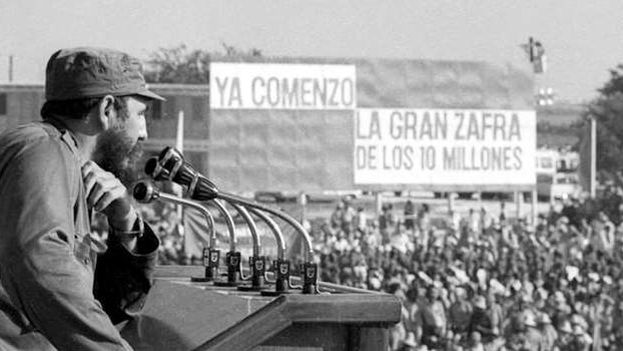
![]() 14ymedio, Reinaldo Escobar, Havana, 24 November 2017 — Throughout my adolescence I had a recurring dream related to Mr. Fidel Castro. It used to repeat itself on the nights he delivered those endless speeches in front of hundreds of thousands of people.
14ymedio, Reinaldo Escobar, Havana, 24 November 2017 — Throughout my adolescence I had a recurring dream related to Mr. Fidel Castro. It used to repeat itself on the nights he delivered those endless speeches in front of hundreds of thousands of people.
My fingers would perceive with amazing clarity the texture of the upper edge of the podium, where I would balance myself on open arms while swinging back and forth. Sometimes I suddenly changed my position and with both hands would first caress and then change the arrangement of the five microphones facing me. Every time I touched them I generated a silence among the audience and not only those in the plaza but also the other thousands who were following my speech on television.
If, during those seconds I frowned, gave a slight smile or lingered with my gaze lost in the distance, I generated an additional expectation. That was the precise moment I let fly with what would ultimately be the center of my address, which the next day would be the headline in all the newspapers and, with complete certainly, would become another event to commemorate in the future.
Ordinary mortals don’t know what it feels like in the moment to have thousands of eyes focused on your face, attentive to every gesture, thousands of ears trying to anticipate your next word. The pleasure of being the master of this situation is incomparable. Then I speak with the appropriate inflection in my voice: firm, almost militaristic, if I am responding to a threat; sarcastic, if it is preferable that the message only be decoded by good listeners; sweet or sad, when I allude to past glories; cheerful and confident to promise a future conquest.
I have spoken and I take the opportunity to caress the curls of my hair (I am hairless) when an ovation escapes from all the throats and the applause continues in a crescendo without limits. From a corner of the square someone – an older man, a young woman, maybe a child – has uttered my name such that the crowd feels invited to repeat it, at first slowly and then at a syncopated rhythm. Then I woke up.
Almost twenty years had passed without having Fidel Castro as the protagonist of my dreams, until one night he returned. This time he was no longer inside my skin but was just six feet away from me. He was surrounded by his bodyguards and his eyes met mine. That’s when, with his usual arrogant tone, he asked me: “And what was it that you had to tell me?”
As I was working through an endless stream of questions and reproaches, the Comandante suffered a slow but remarkable metamorphosis. On more than one occasion he tried to interrupt me with his index finger escaping from a threatening fist, but he could not articulate a single word and only managed to look at his increasingly diminished escort as if to ask who had allowed me to get so close.
My voice changed with each reproach and it was not me who accused him, but his victims. I spoke in the first person as those shot, those sentenced to 20 or 30 years, those stripped of their property, those excluded because of their religious beliefs or their sexual preference, the dividing up of the revolutionary flock by minimal discrepancies, those who died or suffered for following their irresponsible decisions. Sometimes I spoke as an individual, sometimes I sounded like a gigantic chorus from the distance of all the exiles or from the bottom of the sea.
In the midst of the great accusations, sometimes the spark of an apparently minor detail appeared, as when he insulted the national symbol by signing a flag that a friend took to the North Pole; his own children that he sired but refused to recognize; the promises he never fulfilled; his allergy to self-criticism; his lack of piety; the propensity to satisfy his whims at any price was necessary.
At the end of this dream episode, often repeated, he always remained alone. His clothes did not have the bright olive-green that he wore for years but the confused gray-blue of a prison uniform or the worn-out pajamas of the forgotten in an asylum. He was alone and crying, not in repentance, but in anger.
I no longer dream of him. It is not healthy. The man who taught us to hate did not take away my compassion for the defeated.
___________________________
The 14ymedio team is committed to serious journalism that reflects the reality of deep Cuba. Thank you for joining us on this long road. We invite you to continue supporting us, but this time by becoming a member of 14ymedio. Together we can continue to transform journalism in Cuba.
